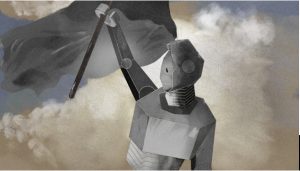The Apostles and Colonialism
The spearhead of the Roman Empire’s expansion was amazingly efficient. It was both militarily and economically based, devoid of justice and morally bankrupt, both powerful and lustful. And as a society basking in these virtues, her hungry eyes were set upon other nations and peoples one after another; to devour them.
The Roman military complex conquered lands, forced open new markets and gave the elite new arenas of intrigue and speculation. With more elbow room to articulate, the economy (on the heels of invasion) was primed, locked and unloaded on vulnerable markets. No sooner than everything had been neatly packed into the coffers of the rich (raw materials, peoples, resources, land, wealth, etc.) that the darlings of Rome were on to the next territory. Rinse, wash, repeat.
Israel, a nation thousands of years more ancient than Rome, was ripe for a good plundering. In 63 B.C. the Roman political and military leader Pompey arrived in Jerusalem and sacked the city. The territory would soon be reorganized across political and economic lines and divided into provinces. At the head of each province was a puppet king to mediate the interests of the Roman elite. Under these new tidings the territory became a hot bed of civic unrest, rebellion and revolt; by Christ’s day Judea had literally become a police state.
The hostilities only intensified. Burdens placed upon the people were so inhuman (even by Roman standards) that Rome’s government became synonymous with violence. In some accounts the poor paid up to 40% of the national income in taxes alone! And as the people gradually lost their ancient lifestyle to the apparition known as Roman colonialism, revolutionary measures by the exploited increasingly became a more appealing response.
In Judea during the Second Temple period rebellions, revolts and uprisings continued to come and go. Radical groups such as the Zealots and the Sicarii (dagger-men) organized to rid the fatherland of Gentile occupation–most often by violent measures. In every case their own methods betrayed the cause by allowing the much stronger Rome, in turn, to justify more oppressive countermeasures. It was a vicious cycle and soon the idea of restoration grew hopeless.
Soon, as it was written, a new organ for liberation arrived and it gained popular support. It was unlike anything before it. This new vanguard developed into a cunning political weapon that could deliver real blows to the colonial whore. Finally victory was in sight.
Most understand this new political bond to be Christian and that Jesus is important to its victory. This is true. But what did it all look like? How is this war fought?
In a word, guerilla warfare.
To Jesus Christ and his apostles Rome would inspire in them a very strong desire. A desire to bring about her complete and utter eradication. If alive today, the twelve would be active to overthrow the West using the same guerilla tactics used against Rome.
Guerilla warfare does not necessarily first start with picking up a weapon. You have to put “first things first” and become educated to, in turn, educate the people. Most revolutionaries since Christ understood the same.
In Jesus’ day the people were lacking the most basic necessities of life and were pressed daily under a government that perpetuated their social misery. He and the Apostles started with this basic premise: people need food, clothing, shelter and education; then Rome will die.
In his own day and concerning the priorities of the oppressed, the Revolutionary Mao Tse-tung if China said,
People who live at subsistence level want first things to be put first. They are not particularly interested in freedom of religion, freedom of the press, free enterprise as we understand it, or the secret ballot. Their needs are more basic: land, tools, fertilizers, something better than rags for their children, houses to replace their shacks, freedom from police oppression, medical attention, primary schools.
By all accounts Charmian Mao and the Jesus camp are in agreement.
When Peter said to Jesus that he and the others left all to follow him notice carefully how he responded,
There is no man that hath left house, or brethren, or sisters, or father, or mother, or wife, or children, or lands, for my sake, and the gospel’s, But he shall receive an hundredfold now in this time, houses, and brethren, and sisters, and mothers, and children, and lands, with persecutions; and in the world to come eternal life. (Mark 10:28-30)
By banding together and pooling resources the followers of Christ broke the chains of oppression. First things were put first and there was no social lack. This scared the hell out of Rome. This movement from the Galilean ghetto, the revolution Jesus was born to lead, was gaining ground.
30 years earlier, on news of his coming birth, Mary was extremely excited: God would “give to Jesus the throne of his father David: And he shall reign over the house of Jacob for ever; and of his kingdom there shall be no end” (Luke 1:32-33). Mary was bursting with hope because she understood David and what his throne represented. It was a government built upon justice and sought daily equity for the people. Juxtaposed against Rome, this was gospel indeed.
What mattered mostly was that a concrete kingdom was coming in the here and now; not in some abstract vacuum of space above the literal clouds (a kingdom in the “after life”).
Excited by this tangible salvation, Mary went to visit her cousin Elizabeth. With joy she said,
[God] hath shewed strength with his arm; he hath scattered the proud in the imagination of their hearts. He hath put down the mighty from their seats, and exalted them of low degree. He hath filled the hungry with good things; and the rich he hath sent empty away. He hath helped his servant Israel, in remembrance of his mercy; (Luke 1:51-54)
Daniel (chapter 2) also speaks of these same days Mary experienced –i.e. the days that were “to come to pass” when the Kingdom of God shall be established. He reveals that these “latter days” are the days of the Roman Empire of Jesus’s day, being strong as iron. In these days God shall “set up a kingdom, which shall never be destroyed: and the kingdom shall not be left to other people, but it shall break in pieces and consume all these kingdoms, and it shall stand for ever” (Daniel 2:44).
Jesus confirms Daniel’s revelations: “Jesus came into Galilee, preaching the gospel of the kingdom of God, And saying, The time is fulfilled, and the kingdom of God is at hand: repent ye, and believe the gospel” (Mark 1:14-15).
If the kingdom is at hand, that is to say within arms reach, then Jesus’s disciples have work to do.
We must first be educated in this struggle to be effective in destroying world principalities. Jesus told all his disciples,
All power is given unto me in heaven and in earth. Go ye therefore, and teach all nations, baptizing them in the name of the Father, and of the Son, and of the Holy Ghost: Teaching them to observe all things whatsoever I have commanded you: and, lo, I am with you always, even unto the end of the world. Amen. (Matt 28:18:20)
Revolutions are not bound only in military action. In fact, in many cases they are dependent on how well the masses are educated in revolutionary politics, how well each understands the battle and are aware of the issues at stake.
The Jewish revolts and radical factions like the Zealots and dagger-men failed because they were reactionary, emotional and ignorant of God’s plan for redemptive struggle; they were inverse to the Jesus movement.
Not Mary. She understood her son’s movement. The fact that she was highly favored to raise the revolutionary lets us know she herself was radical. Likewise her response to the good tidings informs us she was also educated politically. In our case, we are to be aware that the strength of this war is the God of the heaven and earth. This does not justify our idleness, but rather it requires our action. We also know that our enemies are all enemies of life. Colonialism and capitalism (or any inherently evil phenomenon) embody death and as such are natural enemies.
To discern this at all we must be educated.
If Jesus was right about anything it was that his message empowers us to deliver fatal strikes against this beast society; and how to erect a new state structure in its place. The apostles proved its legitimacy in practicing Jesus’s playbook. If we agree, let’s work together to get that same message out.
Let us build on true independence and salvation for the people
You can reach us the (NMP) at 716-885-2289



